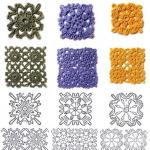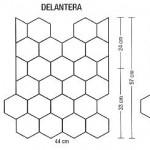What is better to take to the maternity hospital? What to take with you to the maternity hospital: the most complete list of necessary things
The site provides background information for informational purposes only. Diagnosis and treatment of diseases must be carried out under the supervision of a specialist. All drugs have contraindications. Consultation with a specialist is required!
What should an expectant mother take to the maternity hospital?
 For the expectant mother It is recommended to prepare things that need to be taken to the maternity hospital two weeks before the expected date of birth. If a woman has already chosen the maternity hospital where she plans to give birth, she should familiarize herself with the list of things that she may need. You should not be embarrassed to ask your doctor about this, because the lists of necessary things that mommy is allowed to take to a commercial (paid) or government institution are somewhat different.
For the expectant mother It is recommended to prepare things that need to be taken to the maternity hospital two weeks before the expected date of birth. If a woman has already chosen the maternity hospital where she plans to give birth, she should familiarize herself with the list of things that she may need. You should not be embarrassed to ask your doctor about this, because the lists of necessary things that mommy is allowed to take to a commercial (paid) or government institution are somewhat different. Usually, personal belongings are allowed to be taken to a paid maternity hospital, and the list can be almost unlimited, and in government institutions other internal regulations are observed, and the expectant mother will have to give up some of the planned things.
If expectant mother takes any medications constantly, or they are prescribed by a doctor and the course of taking them has not yet been completed, then this point should be reflected in the mother’s exchange card. The woman should remember to take the necessary medications with her, taking into account the expected time of stay in the maternity ward.
The proposed list will help you not to forget the most important things and will give you the opportunity to create your own personal list of things you need.
Documentation:
- passport;
- health insurance policy;
- birth certificate or referral to the maternity ward, contract for childbirth, insurance certificate from the pension fund;
- exchange card prepared by the antenatal clinic doctor who led pregnancy(it should contain all the results of tests and ultrasounds necessary for the maternity hospital).
To the documents, do not forget to add the doctor’s phone number, if you agreed with him on the management of obstetric care, and money that may be useful to you to purchase necessary items or medicines.
Cloth:
- bathrobes – 2 pcs.;
- nightgowns or long T-shirts, comfortable for feeding – 2-3 pcs.;
- panties (preferably disposable) or special postpartum panties – 1-2 packs;
- bras (better for nursing) – 2 pcs.;
- headscarf – 1 pc.;
- socks (cotton and warm) – 1-2 pairs;
- office slippers (easy to clean);
- shower slippers (rubber);
- clothes and replacement shoes for the husband (during partner childbirth).
Clothes for the maternity hospital should be made from natural fabrics (but not wool), that are easy to wash, and suitable for the season. During childbirth, the expectant mother may find it more comfortable to wear a long T-shirt with a fastener on the chest and a special sterile cap that is placed on her head so that the hair does not interfere with the woman's birth process. Wardrobe items should not restrict movement or put pressure on certain areas of the body, and shoes should be easy to wash and dry. Before packing, you need to wash, iron and put them in a clean bag. Don't forget to bring bags for dirty clothes and laundry.
The doctor may recommend that a woman, as prescribed by a phlebologist, purchase special anti-varicose (compression) stockings. In some cases, the expectant mother will need to purchase and take with her a special postpartum bandage. It is better to buy such things after consulting with a doctor, who will advise the woman on the most suitable model and will help determine the size of the bandage or stockings she needs.
Hygiene items:
- liquid soap;
- shower gel;
- intimate hygiene gel;
- shampoo;
- antiperspirant or deodorant;
- shower sponge;
- toothpaste and brush;
- manicure accessories;
- pads (you can use homemade ones from old bed linen, highly absorbent pads or special ones urological pads for women in labor) – 2-3 packages;
- dry and wet wipes for face and hands;
- soft toilet paper;
- small towels for hands and face – 2 pcs.;
- breast pads;
- hygienic lipstick;
- face and hand creams;
- protective cream for nipples (Bepanten, for example);
- disposable razor;
- comb, hair clips or headband;
- disposable diapers for childbirth and gynecological examination – 1 package;
- sterile gauze wipes.
- boiled meat of low-fat varieties;
- chicken with broth;
- low-fat dairy products (in sealed packages);
- green apples;
- bananas;
- prunes and dried apricots;
- juice from green apples;
- tea (black or green, without aromatic additives);
- biscuits or crackers;
- still mineral water.
- fatty, salty, fried, hot or spicy foods;
- red fruits, berries and vegetables;
- carbonated drinks;
- dairy products with added flavors and natural allergenic components;
- pastries, ice cream, chocolate, cakes;
- alcoholic drinks and tobacco products.
- mobile phone and a charger (don’t forget to top up);
- contact numbers for your doctor, pediatrician and breastfeeding specialist;
- notepad and pen;
- favorite book;
- headphones and player with your favorite music;
- utensils (plate, spoon, fork, cup);
- breast pump;
- night light;
- a camera or video camera (you must first consider the aspects of their safe storage);
- small table mirror.
- diapers for 3-6 kg – 1 package;
- disposable diapers – 1 package;
- wet wipes for newborns – 1 package (72 pcs.);
- cotton diapers – 6-7 pcs.;
- flannel diapers – 3-5 pcs.;
- cotton caps – 2 pcs.;
- flannel caps – 2 pcs.;
- hats (according to the season) – 1-2 pcs.;
- vests – 4-5 pcs.;
- bodysuit and rompers (if swaddling of the child is not provided) – 3 pcs.;
- warm socks – 2 pairs;
- anti-scratch mittens – 2 pcs.;
- overalls and warm sweaters - if necessary.
- baby soap;
- soap or powder for washing children's clothes;
- powder;
- baby cream and oil;
- cotton swabs with limiters for cleaning the nose and ears;
- scissors for cutting nails for newborns.
- uncomfortable clothes;
- shoes that are not easy to wash and create noise when walking;
- wool clothing;
- new, unwashed clothes;
- heating devices;
- perfumery products that can cause an allergic reaction and irritate the smell of roommates;
- a camera or video camera (if filming is prohibited and reliable storage conditions are not provided);
- alcoholic drinks and tobacco products;
- foods not recommended for the mother's diet;
- medications that were not prescribed by a doctor.
In some cases, a woman may need earplugs (if her roommates interfere with her sleep or rest). Particular attention should be paid to the choice cosmetics for personal hygiene, because they must be hypoallergenic and suitable for the mother’s skin type (you can consult your doctor in advance about their choice).
Food:
List of permitted products:List of prohibited products:
In some cases, if food is provided to a woman in labor in the maternity hospital, she may be limited to a supply of drinking water. Other maternity facilities may have a more strict list of prohibited foods. That is why this issue also needs to be discussed with your doctor in advance.
Necessary and pleasant little things:
What to take to the maternity hospital for your baby?
Clothes, diapers, nappies:If you have any questions about the temperature in the maternity ward, you can ask your doctor or maternity hospital staff. If necessary, you can take a blanket for your child with you.
Hygiene products:
What should you not take to the maternity hospital?
You should not take bulky items with you to the maternity hospital that will cause inconvenience to the mother, as well as things that are prohibited in the institution of your choice. The following are prohibited in most maternity institutions:It is not recommended to take clothes and necessary items with you to the maternity hospital for the mother and baby to be discharged, since they can be brought by relatives and friends a day or two before discharge. In some cases, when there is no one to meet a woman upon discharge, this issue can be resolved with the management of the institution in advance.
By the end of the 8th month of pregnancy, labor can begin at any time. In order not to experience discomfort, do not pack things for the maternity hospital at the last moment, risking forgetting necessary items, responsible expectant mothers pack their bags in advance.
What does the list of things for the maternity hospital include? Ask the reception department what you need to take with you and what things you don’t need. Each maternity hospital has its own rules and lists, which may change depending on the time of year.
Things for a child in the maternity hospital
It's better to take more than you need
The list of things to take to the maternity hospital consists of essential items for mother and child. You need to take only the essentials that you need all the time, otherwise you risk bringing a couple of extra suitcases with you. Therefore, when collecting things for an important event, be guided by the principle: only what you cannot do without. What are these things?
All the things you need should be divided into three parts:
- mother during the period before and during childbirth;
- mother, which are necessary during the postpartum period;
- newborn.
Some items, such as dishes, will be necessary for a woman throughout her stay in the maternity hospital. But it’s still better to pack yourself two separate bags. The first one should be unpacked immediately after admission to the maternity hospital (items that will be needed before the birth). Leave the second one for later. This will avoid unnecessary hassle and confusion.
One more thing: if you are planning a joint birth, collect a separate package for your husband.
When packing, be guided by the following principles:
- Pack the documents into a separate file or folder;
- Place all items strictly in plastic bags. Sanitary and epidemiological standards in maternity hospitals prohibit bringing leather or fabric bags from home;
- divide the list into 3 parts: to the delivery room, postpartum ward, discharge (and also to the husband, if the birth is joint). Prepare transparent bags and label them;
- You can leave the discharge package at home. Later his relatives will bring him.
What to take to the maternity hospital for your baby?
What things does a baby need in the maternity hospital? The most necessary things are:
- 4 diapers – 2 flannelette and 2 calico;
- vests and bodysuits – 2 pcs.;
- anti-scratch pads for a newborn's arms (babies are born with long nails and may injure themselves);
- hat and cap;
- jumpsuit and romper – 2 pcs.;
- big terry towel or blanket;
- packaging of diapers (size 0-1);
- package disposable diapers;
- baby diaper cream for newborns (usually the doctor advises the woman which one is best to use);
- baby powder. Better than ordinary Soviet without aromatic additives;
- a pack of wet wipes for newborns;
- cotton swabs with a limiter for cleaning the nose and ears;
- safety scissors for newborns to trim nails;
- formula feeding bottle. Useful in case of absence breast milk. Be sure to boil it at home;
- liquid soap for children.

Packing a bag with things
This full list things for the maternity hospital for the baby and mother. Coordinate it with your doctor, since some maternity hospitals prohibit taking cloth diapers and gowns with you, but give them to women in labor on the spot, just like disposable diapers.
When choosing clothes for a newborn, follow the rules:
- Buy clothes for your baby only from natural fabrics. The newborn has a vulnerable and thin skin susceptible to allergies. The threads used to sew clothes must be cotton.
- At first, until the baby gets used to the clothes, seams, fasteners, and seals will interfere with him. With this in mind, buy items that have ties and the seams facing out.
- The rompers should have wide knitted rubber that will not damage the umbilical wound.
Depending on the time of year, the list of clothes you need to bring with you may change.
in winter
In late autumn, winter, spring, take:
- a pair of warm bodysuits;
- warm socks or booties – 3-4 pairs;
- a warm wadded blanket so that the baby does not get cold while sleeping;
- warm hat – 2-3 pcs;
- A warm envelope will be useful for discharge in winter; you should buy it in a specialized store.
In summer
In summer or late spring, refuse a warm blanket and replace it with a blanket or terry towel. Replace all insulated items: bodysuits, overalls, socks, hats with lighter ones.
What to discharge your child in in the summer and spring, be guided by the weather. A demi-season or summer set is perfect. If it's cool, wrap your baby in an extra thin blanket or flannel diaper.
A set of things for the maternity hospital for mom

Medicines from home
What things will the mother need in the maternity hospital? Take with you:
- a cotton robe and a loose shirt. You can purchase the kit immediately;
- Two pairs warm socks, just not wool ones. During and after childbirth, women often suffer from chills;
- rubber slippers that can be easily washed in the shower;
- drinking still water - at least 2 bottles of 0.5 liters each. Light food that does not spoil, a thermos with tea will come in handy;
- a small terry towel for wiping your face with cold water during childbirth;
- hygienic lipstick, which will prevent the appearance of cracks on the lips (during childbirth, lips become very dry);
- elastic bandages or stockings for women who have varicose veins veins;
- hair clip or elastic band;
- disposable toilet seat covers.
The baby in the delivery room will need:
- pilch;
- socks and anti-scratch pads;
- diaper;
- thin hat with ties;
- flannelette blanket.
These items are needed directly in the delivery room, so prepare them in advance, wash and iron them on both sides.
If you are planning a partner birth, take your husband:
- results of fluorography and other studies. Find out in advance at the maternity hospital what tests your partner needs to undergo in order to be allowed to give birth;
- clean clothes (T-shirt with light pants or surgical suit);
- disposable cap and mask, shoe covers.
Some maternity hospitals allow you to take a camera with you to take photos and videos.
Necessary documents for the maternity hospital

We take everything
When entering the maternity ward, a woman must have the following documents with her:
- ID card (passport and photocopy);
- individual exchange card for a pregnant woman (issued at the antenatal clinic). The card contains the results of examinations of the woman throughout the entire pregnancy;
- medical insurance policy;
- individual personal account insurance number (SNILS);
- referral from a gynecologist (issued at the antenatal clinic);
- birth certificate;
- birth contract (if available).
Don't forget about money. Take a small amount of cash and a plastic card. This will help you save money; if necessary, you can withdraw money from an ATM (they are installed in all modern maternity hospitals).
Hygiene items before childbirth

What mom will need
Before giving birth, a woman will need the following hygiene and care items:
- 2 towels – for hands and shower;
- a pack of disposable diapers 90x60 (necessary for examinations and childbirth);
- underwear – bras and panties;
- wet and dry wipes;
- enema. The intestines are cleaned at the beginning of contractions, but sometimes there is a need for a repeat procedure;
- bags for dirty laundry and garbage.
Postpartum period in hospital
After giving birth, a woman will need the following things:
- bras. Include a special nursing bra in your shopping list. Before purchasing, keep in mind that with the appearance of milk, your breasts will increase by at least 1 size;
- a shirt that fastens in the front and has straps to make feeding the baby convenient;
- disposable panties. After giving birth, your underwear will have to be changed frequently, but there will be no opportunity to wash it;
- slippers;
- mug, tablespoon and teaspoon, plate;
- personal care products: comb, toothbrush and toothpaste, soap, shampoo;
- sanitary pads with maximum absorbency - especially for women in labor.
It won’t hurt to take with you a bag of dried goods, a pack of cookies, apples, and tea bags. Labor may end late at night, and the woman needs a snack. After childbirth, appetite increases, and canteens are closed at night.

For personal hygiene and recovery
You should also take with you:
- cream for cracked nipples. When the baby starts sucking the breast, the nipples will be injured. A special cream (Bepanten) will speed up the healing of cracks, and an ice cube will relieve pain. Prepare ice in advance and keep it in the refrigerator (assuming there is a freezer in the delivery room);
- postpartum bandage. It supports the abdominal muscles and prevents the skin from sagging after childbirth;
- glycerin suppositories. They will be useful if the birth was complicated and stitches were applied to the tears. In this case, you cannot push, but candles will help you go to the toilet without any problems;
- Magnesia. Useful for compresses in case of lactostasis;
- breast pump It will come in handy if for some reason you cannot feed your baby. It is difficult to express breasts with your hands, especially for beginners. A breast pump will ensure the preservation of milk and breastfeeding in this situation;
- thermometer for measuring the temperature of a newborn.
When leaving the maternity hospital, ask relatives to bring the child’s belongings:
- envelope for discharge. Focus on the weather. If it’s winter outside, buy a winter envelope, on sheepskin, if it’s summer, buy a thin one. In the off-season, an envelope with padding polyester is suitable;
- suit or overalls;
- cap;
- beautiful bow.
Things for mom to check out:
- decorative cosmetics;
- hair styling products;
- elastic bands, hairpins;
- beautiful clothes and shoes.
Make arrangements in advance to transport your baby home. Buy a bassinet or Baby chair for auto.
Upon discharge from the maternity hospital, you should be given the following documents:
- Child's birth certificate. It is required for registration with the Civil Registry Office.
- Discharge summary of the development of the newborn. It should be given to the local pediatrician.
- Extract from the birth history. Necessary for a gynecologist in a antenatal clinic.
These things will definitely come in handy
According to the rules, a woman in labor spends 3 days in the maternity hospital after giving birth. During this time, doctors examine the child and mother so as not to miss the development of complications. The following will help you brighten up your leisure time and keep yourself busy during this period:
- pen and paper for notes;
- player and headphones;
- books. Books about childbirth, caring for a newborn, and developmental features are useful.
If you forgot something, don’t worry. Every maternity hospital has a pharmacy where you can buy everything for mother and baby: powder, baby cream, diapers, pads, etc.
Thank you 0
You might be interested in these articles:
IN recent months pregnancy, starting from the 36th week, a woman, as they say, should be in full combat readiness. At any moment, the little one can “knock” and “ask to be born.” Contractions, after which they almost always begin suddenly, and the expectant mother must grab the things she collected earlier and run to the maternity hospital.
From personal experience
The first preparations for the maternity hospital followed a strict list, which was announced in the antenatal clinic. I don’t remember what it included, but the package was modest, and as a result, my husband ran to the maternity hospital, now with a spoon, now with a pacifier, now with pads...
The second time I became smarter and “downloaded” the list from the Internet. My husband looked at me getting ready for the maternity hospital, to put it mildly, with surprise. “Are you moving?” - he asked when I packed a huge bag and placed it next to three bags. Otherwise! A set of bed linen, a small electric kettle, a hairdryer, books, magazines and even an MP3 player is already a rather large package. And a lot of things for the baby, for the doctor, and for yourself, your beloved. Well, I didn’t forget about him (they were going to give birth together). Where would he be without slippers, a robe and a razor?
As a result, I went to the maternity hospital with a “mini-kit”, and my husband supplied everything else as needed. Thank God that he had the patience to convince me that I wouldn’t need everything in the maternity hospital. I can imagine how the maternity hospital workers would greet me. The third time I will definitely get ready without unnecessary things, but with everything necessary.
In the meantime, let’s discuss what should be taken to the maternity hospital and what should not be taken.
Traditional list
Each maternity hospital has its own characteristics, and the lists of necessary things are very different. For example, if in the maternity hospital where you are going to give birth, hot water by the hour, otherwise there is none at all, then you will simply need an electric kettle. Therefore, be sure to take into account the conditions of the maternity hospital.
But still, the main set is traditional things, which you cannot do without even in the most modern maternity hospital with all the amenities.
Documentation
- Passport (without it they will not be discharged from the maternity hospital);
- Exchange card (without it they will be sent to the observation department);
- Agreement with the maternity hospital (if any);
- Insurance policy (if any);
- Passport, sterile clothing for the accompanying person (for partner childbirth);
- Money.
Personal care products
- Soap. Some maternity hospitals require liquid soap and disposable towels;
- Toothpaste and brush;
- Toilet paper;
- Towels;
- Disposable diapers (useful for both baby and mother);
- Pads (special postpartum pads are sold, but some doctors advise using regular torn sheets);
- Underwear (comfortable panties (several pieces), nursing bras, and breast pads);
- Cloth. Preferably two nightgowns with a comfortable top for feeding, a dressing gown for the season, slippers (must be washable);
- Cosmetics (for those times when you can’t do without face and hand cream).
Things for the baby
This list is the most pleasant and is worth paying the most attention to.
- Diapers (it is best to take a whole pack of diapers for newborns, because you will not have the opportunity to wash the diapers if you are determined to use them in the future);
- Wet wipes (however, to avoid allergic reactions, it is better to wash the baby clean boiled water using ordinary cotton wool);
- Baby skin care products (powder, diaper rash cream, lotion);
- First aid kit (belly button care products are a must, ask your pediatrician about everything else);
- Disposable diapers.
Pacifiers, bottles and formula cause a lot of controversy.
Baby clothes
Choose clothes based on the season. The number of things should be sufficient, but not excessive. Size - from 56 to 62. Pre-wash and iron clothes. You will need:
- Hats;
- Bodysuit or vest;
- Knitted blouses;
- Diapers (thin and flannel);
- Socks, thin mittens;
- Blanket.
Prenatal and postnatal first aid kit
Agree on the list of medical supplies with your doctor. Each maternity hospital requires certain medications, and some offer their own, or ask you to buy them as needed. However, it wouldn’t hurt to buy some pharmaceutical “remedies”:
- Bandage and cotton wool;
- Syringes, vein catheter, dropper;
- Oxytocin;
- Kedgood;
- Sterile medical gloves;
- Glycerin-based laxative suppositories;
- Ointment for cracked nipples;
- Digital Thermometer;
- Hydrogen peroxide;
- Zelenka;
- Tincture of calendula.
Items to be checked out
It is not necessary to take a bag with these things with you to the maternity hospital. It will be brought to you immediately before discharge. It should contain elegant things for the baby and mother. Please note that the things you wore to the maternity hospital will not fit you when you leave.
Other
- Water without gas;
- Herb tea;
- Cookie.
You may also need the following things:
- Breast pump;
- Dishes;
- Electric kettle or boiler;
- Thermos.
However, do not rush to pack everything into bags for the maternity hospital. These things should be in a visible place so that, if necessary, your husband can see them and bring them to you at the maternity hospital.
List of "absurdities"
You can find fault with all of the above. For example, why use a breast pump when in the first days there is no milk at all, but only colostrum, which, as it seems to every mother, is not enough for the baby, so they rush to feed the baby with formula.
Or cosmetics. It’s hard to believe that a new mother will have time to paint her lips and eyelids immediately after giving birth. But, to each his own. When you are discharged, you want to be in full swing.
However, there are more absurd things in the proposed lists:
- Watch;
- Knitting;
- Books;
- MP3 player;
- A cheese sandwich;
- Washing powder;
- Basin;
- Baby monitor;
- Pillow;
- Night lamp;
- Elegant dress;
- Limousine and others.
However, if you see the meaning in these things, then feel free to take them to the maternity hospital. The main thing is that you feel comfortable and comfortable. Good luck!
Especially for- Tanya Kivezhdiy






